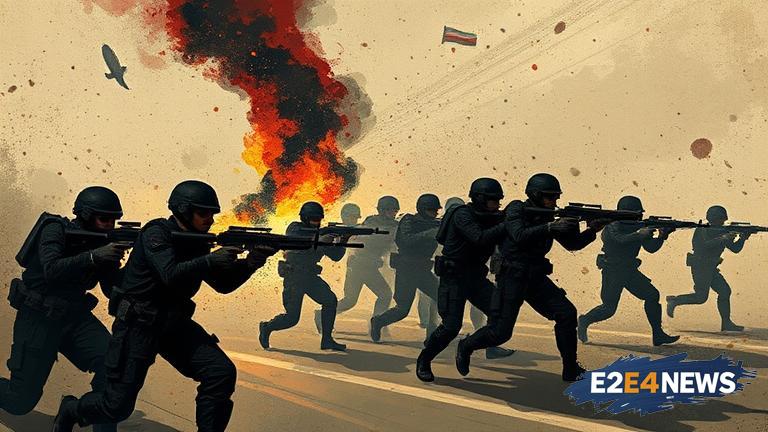Iran has been involved in a series of clandestine attacks abroad, with the aim of furthering its interests and promoting its ideology. The country has a long history of using covert operations to target rival nations and opposition groups, often with devastating consequences. From the 1980s to the present day, Iran has been linked to numerous attacks on foreign soil, including bombings, assassinations, and kidnappings. One of the most notable examples is the 1983 Beirut barracks bombing, which killed 299 people, including 241 American servicemen. Iran has also been accused of carrying out attacks on Israeli and Jewish targets, including the 1994 bombing of the AMIA Jewish community center in Buenos Aires. In recent years, Iran has been linked to a series of cyberattacks on foreign governments and companies, including a 2019 attack on the US government’s computer systems. The country has also been accused of supporting militant groups, such as Hezbollah and Hamas, which have carried out numerous attacks on Israeli and other targets. Iran’s use of clandestine attacks has been widely condemned by the international community, with many countries viewing it as a threat to global security. Despite this, Iran continues to deny any involvement in such attacks, and has instead blamed its enemies for carrying out false flag operations. The country’s use of covert operations has also been seen as a way of avoiding direct confrontation with its enemies, while still achieving its strategic objectives. However, this approach has also been criticized for being counterproductive, as it can lead to increased tensions and instability in the region. Iran’s history of clandestine attacks abroad is a complex and multifaceted issue, with roots in the country’s revolutionary ideology and its desire to promote its interests in the region. The country’s use of covert operations has been shaped by a range of factors, including its relationship with other nations, its economic interests, and its strategic objectives. In order to understand Iran’s use of clandestine attacks, it is necessary to examine the country’s history and ideology, as well as its relationships with other nations. This includes looking at the country’s revolutionary past, its experience of war with Iraq, and its current relationships with other nations in the region. It is also necessary to examine the role of the Iranian Revolutionary Guard Corps (IRGC), which has been accused of carrying out many of the country’s clandestine attacks. The IRGC is a powerful and influential organization in Iran, with a significant role in the country’s military and security apparatus. The organization has been accused of carrying out a range of clandestine operations, including bombings, assassinations, and kidnappings. In addition to its use of covert operations, Iran has also been accused of supporting militant groups, such as Hezbollah and Hamas. These groups have carried out numerous attacks on Israeli and other targets, and have been widely condemned by the international community. Iran’s support for these groups has been seen as a way of promoting its interests in the region, while also avoiding direct confrontation with its enemies. However, this approach has also been criticized for being counterproductive, as it can lead to increased tensions and instability in the region. Overall, Iran’s history of clandestine attacks abroad is a complex and multifaceted issue, with roots in the country’s revolutionary ideology and its desire to promote its interests in the region. The country’s use of covert operations has been shaped by a range of factors, including its relationship with other nations, its economic interests, and its strategic objectives. As the international community continues to grapple with the challenges posed by Iran’s clandestine attacks, it is necessary to examine the country’s history and ideology, as well as its relationships with other nations. This includes looking at the country’s revolutionary past, its experience of war with Iraq, and its current relationships with other nations in the region. It is also necessary to examine the role of the IRGC, and the ways in which the organization has been involved in clandestine operations. By understanding the complexities of Iran’s use of clandestine attacks, it is possible to develop more effective strategies for countering the country’s covert operations, and promoting greater stability and security in the region. Iran’s clandestine attacks have also had a significant impact on the country’s relationships with other nations, with many countries viewing it as a threat to global security. The country’s use of covert operations has also been seen as a way of avoiding direct confrontation with its enemies, while still achieving its strategic objectives. However, this approach has also been criticized for being counterproductive, as it can lead to increased tensions and instability in the region. In order to address the challenges posed by Iran’s clandestine attacks, it is necessary to develop a more nuanced understanding of the country’s history and ideology, as well as its relationships with other nations. This includes looking at the country’s revolutionary past, its experience of war with Iraq, and its current relationships with other nations in the region. It is also necessary to examine the role of the IRGC, and the ways in which the organization has been involved in clandestine operations. By understanding the complexities of Iran’s use of clandestine attacks, it is possible to develop more effective strategies for countering the country’s covert operations, and promoting greater stability and security in the region. The international community has a critical role to play in addressing the challenges posed by Iran’s clandestine attacks, and promoting greater stability and security in the region. This includes working to develop more effective strategies for countering the country’s covert operations, as well as promoting greater understanding and cooperation between nations. By working together, it is possible to develop more effective solutions to the challenges posed by Iran’s clandestine attacks, and to promote greater stability and security in the region.




